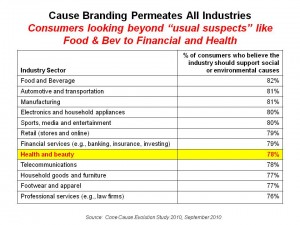 8 in 10 people want companies to help them make changes to their own behavior, including getting more physical activity, eating healthier, and reducing their impact on the environment, according to the 2010 Cone Cause Evolution Study. Even more moms — 9 in 10 — are looking for this kind of support from companies with which they do business.
8 in 10 people want companies to help them make changes to their own behavior, including getting more physical activity, eating healthier, and reducing their impact on the environment, according to the 2010 Cone Cause Evolution Study. Even more moms — 9 in 10 — are looking for this kind of support from companies with which they do business.
Health is top-of-mind when it comes to cause marketing. 8 in 10 people think that companies should support health and disease.
Cone’s study shows that cause marketing hasn’t just gone mainstream: it’s been absorbed into shoppers’ consciousness and figures into personal spending decisions. If a dollar is going to be spent, a growing number of consumers figure, they’d prefer to allocate the buck to a company whose values align with their own.
Nearly 20% of people say they’d even pay a premium for a product based on a cause supported by a company.
For this study, Cone surveyed 1,057 U.S. adults online in July 2010.
Health Populi’s Hot Points: 4 in 5 consumers say they want companies to give them “an opportunity to change their behavior.” This is high-touch corporate-public engagement, and it’s not just about pink ribbons or green sustainability: it’s about how companies can help “me” live better. This is an action orientation, not just an emotional or political ethos.
The implications for health — personal health transformation — are profound here. Companies, in and outside of strictly health ‘care’ (e.g., pharmaceutical, over-the-counter consumer health, medical technology, providers and plans) have an opportunity to partner, through cause marketing strategies and communications, with people to support and bolster their personal health behaviors. This calls for stakeholders in the health care ecosystem to reach out to non-traditional organizations that can help people in their daily lives nudge themselves toward better health-ful decisions: think electronics, transportation, travel, and the mix of industries shown in the table above.
Cone’s survey shows that health is everywhere, and most people embrace this concept.




 I'm in amazing company here with other #digitalhealth innovators, thinkers and doers. Thank you to Cristian Cortez Fernandez and Zallud for this recognition; I'm grateful.
I'm in amazing company here with other #digitalhealth innovators, thinkers and doers. Thank you to Cristian Cortez Fernandez and Zallud for this recognition; I'm grateful. Jane was named as a member of the AHIP 2024 Advisory Board, joining some valued colleagues to prepare for the challenges and opportunities facing health plans, systems, and other industry stakeholders.
Jane was named as a member of the AHIP 2024 Advisory Board, joining some valued colleagues to prepare for the challenges and opportunities facing health plans, systems, and other industry stakeholders.  Join Jane at AHIP's annual meeting in Las Vegas: I'll be speaking, moderating a panel, and providing thought leadership on health consumers and bolstering equity, empowerment, and self-care.
Join Jane at AHIP's annual meeting in Las Vegas: I'll be speaking, moderating a panel, and providing thought leadership on health consumers and bolstering equity, empowerment, and self-care.